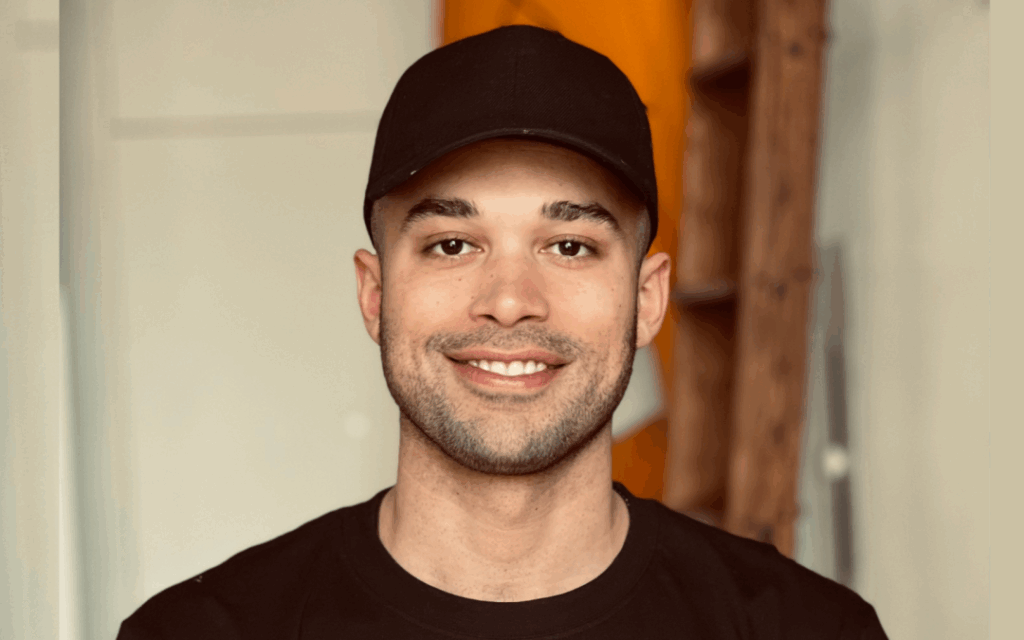Launched with Pride: A Q&A with 2SLGBTQIA+ Futurpreneurs Jackie Toner and Christina Owczarek
Pride Season is a time to uplift and celebrate the voices, identities and contributions of 2SLGBTQIA+ communities — including the bold and brilliant entrepreneurs breaking barriers and building businesses on their own terms.
In Canada, 2SLGBTQIA+-owned businesses contribute an estimated $22 billion to the economy and employ more than 435,000 people. According to the Canadian Gay and Lesbian Chamber of Commerce, there are over 100,000 such businesses across the country. Yet despite their significant impact, these entrepreneurs continue to face barriers: less than 1% of venture capital funding goes to 2SLGBTQIA+ founders, and nearly half say they’ve felt the need to hide their identity in business settings.
At Futurpreneur, we proudly support diverse founders every day of the year. This Pride Season, we’re spotlighting two inspiring 2SLGBTQIA+ entrepreneurs who are building more inclusive spaces through passion and purpose:
Jackie Toner, Founder of The Woods(wo)man, is carving out space — literally and figuratively — for creativity, representation and inclusion in the traditionally male-dominated world of woodworking.
Christina Owczarek, founder of XhAle Brewery, believes in “making the world a better place one pint at a time.” Through her craft beer business, she’s brewing more than just world-class ales — she’s cultivating connection, community and celebration in every sense.
Read on as Jackie and Christina share their journeys as 2SLGBTQIA+ entrepreneurs, the inspiration behind their businesses and what Pride means to them.
What does Pride Season mean to you personally and professionally as an entrepreneur?
Jackie: Pride Season is a fine line. On one hand, it’s powerful to be seen and celebrated — but on the other, 2SLGBTQIA+ folks don’t stop existing the other eleven months of the year. Meaningful support means also showing up when it’s quiet. That said, I really listened to my community and realized I was missing something in my own offerings — representation. So, I launched a Pride Collection that reflects 2SLGBTQIA+ identities not just as a moment, but as something folks can carry with them year-round.
Christina: It’s Pride all year for us. It is a special month, but we do the work all year round. We are social ventures, loud advocates and intentionally take up space 12 months a year. We participate, support and work with other 2SLGBTQIA+ organizations, non-profits and businesses ongoing as part of our core values and community strengthening efforts. Unfortunately, we have also been pushed out of spaces during Pride because we can’t supply monetary transactions or support like other craft breweries who aren’t minority representation owned and run.
What have been some of the unique challenges or breakthroughs you’ve encountered as a 2SLGBTQIA+ entrepreneur?
Jackie: Running Woods(wo)man Woodworking as a 2SLGBTQIA+ entrepreneur has been both challenging and deeply affirming. In a male-dominated craft and rural setting, I’ve often felt like I was forging a path without a map. Visibility remains a barrier — especially for rural 2SLGBTQIA+ entrepreneurs, who are often excluded from urban-centred funding and community spaces. Still, building a business on my own terms has allowed me to create something different: a space where 2SLGBTQIA+ folks, women and marginalized makers aren’t just included — they’re centred. One of the most powerful moments is when someone walks into my booth and says, “I’ve never seen myself in this space before — until now.”
Christina: Being in Alberta comes with its own challenges — especially in today’s political climate, where progressive policies and openness to difference are being rolled back. Our company has been doxed online for being vocal advocates in our community. We’ve lost accounts, revenue and event partnerships for speaking out on harmful gender policies that directly affect us and our community. As 2SLGBTQIA+ entrepreneurs in STEM and craft brewing, we’re often doubted and have to work twice as hard to earn respect and recognition. And yet, we’ve built a loyal following of people who share our values.
What’s one moment of Pride (pun intended!) in your entrepreneurial journey that you’d love to share with us?
Jackie: One moment that continues to stick with me is the first time I ran my bowl-turning course specifically for women and gender-diverse individuals. The course was designed to be a welcoming, inclusive space — a direct response to the many folks who told me they had previously felt unwelcome, unsafe or out of place in traditional woodworking environments. One student said, “This is the first time I’ve felt like I belong in a shop space.” That moment reminded me exactly why I do this: not just to teach skills, but to help carve out spaces where people can show up fully as themselves and feel powerful doing it.
Christina: Probably when we collected our first Canadian Brewing Award in Vancouver. A longtime industry peer quietly acknowledged that not only was this a big a deal to get an award, but the fact that we’ve done it when the world constantly pushes back on you being who we are what we do is even bigger. He saw me, and us in that moment with absolute vulnerability that it brought me to tears.
How has Futurpreneur supported you on your entrepreneurial journey?
Jackie: Futurpreneur gave me the tools to turn my vision into something tangible. With the financial support they provided, I was able to scale my business to a point where I could hire and collaborate with other women and 2SLGBTQIA+ folks. That was a pivotal shift — not just building something for myself, but creating opportunities for others in my community. In a market that often feels divided or exclusionary, it meant everything to be able to grow a business that could hold space for shared values, inclusivity and dignity.
Christina: Honestly, when I received my Futurpreneur loan, there was no diversity programming in place. As a new Canadian, single, 2SLGBTQIA+ woman who lost her job due to COVID, I qualified for the bare minimum — lacking collateral, credit history or a guarantor, despite having over a decade of experience. It’s been encouraging to see Futurpreneur open the annual accelerator to more than just top performers — recognizing that access to capital and lived experience matter.
Ready to launch or grow your business? Futurpreneur supports young entrepreneurs from many diverse communities across Canada. Learn more about Futurpreneur’s flexible, equity-free loan with mentorship and resources here.
5 hidden rules of Canadian business culture every newcomer entrepreneur must know: Insights from workplace culture expert Matt Adolphe
Starting a business in Canada as a newcomer is an exciting adventure but it often comes with its unique set of challenges. You might have an amazing business idea, yet without a solid grasp of how professional relationships and communication truly work in Canada, building and growing your venture can feel like an uphill battle.
So, what are these unwritten rules of Canadian business culture? We chatted with Matt Adolphe, a seasoned workplace culture expert with 25 years of experience in teaching, consulting and facilitating both in Canada and internationally. He’s the author of two insightful books: Canadian Workplace Culture: Mastering the Unspoken Rules and Would You Hire You? His expertise spans career development, leadership, communication skills and conflict resolution, making him the perfect guide for newcomer entrepreneurs aiming to thrive in the Canadian market.
1. Networking is about building trust, not just selling
If you’ve ever attended a networking event expecting to immediately secure a client or close a deal, you might have left feeling disappointed. That’s because networking in Canada is fundamentally about building genuine relationships—not simply transactional exchanges. For newcomer entrepreneurs, this means laying a foundation of trust before pitching your services or products.
What this means for your business:
- Don’t rush into a sales pitch; take the time to genuinely get to know people first.
- Always follow up after networking events to nurture those budding relationships.
- Be patient; building trust takes time and consistent effort.
Matt’s insight: “Frontline staff, like receptionists, are often gatekeepers to decision-makers. How you treat them can determine whether you get the right connections and business opportunities.”
2. Read between the lines—Canadians are indirect communicators
One of the most significant cultural differences newcomer entrepreneurs might encounter is Canada’s indirect communication style. Canadians often express themselves politely rather than being blunt, meaning you need to pay close attention to subtle cues and implied meanings in conversations with potential clients, partners or employees.
Example: If someone says, “Yeah, let’s connect sometime!” in a business context, it might actually be a polite way of declining or indicating a low priority. Canadians often avoid saying “no” outright to prevent perceived conflict. Learning to interpret these unspoken messages is crucial for effective business interactions.
What to do instead:
- Pay close attention to tone of voice and body language.
- If you’re unsure about an agreement or commitment, follow up once for clarification, but avoid pushing too hard.
- In discussions, rather than directly contradicting someone, try to agree with parts of their statement and then gently add your own perspective.
Matt’s insight: “Even disagreeing about the weather can be seen as conflict! Instead of saying ‘Not for me, it’s too cold,’ try, ‘It’s nice, but I prefer it a bit warmer.’ This applies to business discussions too.”
3. Humility wins—Too much self-promotion can hurt you
In some cultures, openly discussing your achievements and promoting yourself is encouraged. In Canada, however, humility is highly valued. Being overly flashy—whether in how you speak about your accomplishments or how you present yourself—can make potential collaborators or clients uncomfortable. For entrepreneurs, striking the right balance is key.
What this means for your business:
- Instead of boasting, let others inquire about your successes; allow your work to speak for itself.
- Dress professionally for business meetings but avoid overly expensive or showy clothing that might create a perception of extravagance.
- Approach business conversations with genuine curiosity about others’ work, rather than focusing solely on self-promotion.
Matt’s insight: “In the U.S., people want to hear about your accomplishments. In Canada, if you talk too much about yourself, it can come across as showing off, which can hinder business relationships.”
4. Volunteering is a secret weapon for networking
Want to rapidly expand your business network and gain credibility within the Canadian market? Consider integrating volunteering into your strategy! In Canada, volunteering isn’t just about giving back to the community—it’s a powerful and often overlooked way to meet influential people and build trust with potential business contacts.
Why it works for entrepreneurs:
- Many business leaders and CEOs are actively involved in community service and charitable organizations.
- People naturally tend to trust those who demonstrate a commitment to contributing to their community.
- It’s an excellent, low-pressure way to showcase your skills and dedication without appearing overly “salesy” or self-serving.
Matt’s insight: “If you’re a tech entrepreneur, offer to help a non-profit with their website. If you’re in marketing, volunteer at a local charity event. These small contributions can lead to truly meaningful business connections and opportunities.”
5. First impressions matter—And they last
Unlike in some cultures where a negative initial interaction can be easily mended over time, a bad first impression in Canadian business culture can be challenging to overcome. For newcomer entrepreneurs, this emphasizes the importance of every initial interaction.
What to keep in mind for your business interactions:
- Be polite and respectful to everyone you encounter, from receptionists to junior staff; every interaction reflects on your professionalism.
- Be highly aware of your tone and body language; your attitude can matter as much as your words in conveying professionalism and respect.
- Be mindful of personal space and avoid interrupting others during conversations; active listening is highly valued.
Matt’s insight: “Hiring managers often ask receptionists how a candidate treated them. Similarly, in business, how you treat everyone in an organization can impact whether you get the deal or build a lasting partnership.”
Cultural awareness: A cornerstone of business success
Adapting to Canadian business culture is just as crucial as having a brilliant business idea. By focusing on authentic relationship-building, understanding communication nuances, embracing humility and engaging with your community, newcomer entrepreneurs can build robust professional networks and achieve lasting success in Canada.
Ready to achieve your business goals in Canada? Futurpreneur’s My Canadian Startup program empowers newcomer entrepreneurs with success strategies and knowledge to help them on their entrepreneurial journeys in their new country. Learn more about us.
Built on strength: Indigenous entrepreneurship and economic sovereignty
Imagine a future where Indigenous communities thrive, empowered by their own vision and enterprise. Indigenous Peoples, a rapidly growing population in Canada, are at the forefront of shaping this future. According to Statistics Canada, Indigenous peoples represent about five per cent of Canada’s population, and their journey towards economic sovereignty has faced historical barriers stemming from colonialism, lack of infrastructure, limited capital and restricted access to opportunities. Futurpreneur believes entrepreneurship is a transformative tool for Indigenous self-determination and economic reconciliation, fostering growth and prosperity.
We asked members of the Futurpreneur Indigenous team about their experiences and how entrepreneurship supports economic sovereignty for Indigenous communities. We also asked how the Futurpreneur Indigenous Entrepreneur Startup Program (IESP) helps young Indigenous entrepreneurs take meaningful steps toward that goal.
Here’s what they shared:

Holly Atjecoutay, Head of DEI and Director, Indigenous and Northern Entrepreneurs
“Historically, Indigenous economies were egalitarian, independent and flourishing, akin to modern-day entrepreneurship. These ways were lost with colonialism. Indigenous people possess blood memory of entrepreneurship; it comes naturally to so many Indigenous youth. At the foundation of Indigenous economic prosperity and reconciliation is entrepreneurship! We are witnessing the revitalization of Indigenous economies, reclaiming our sovereignty and space within the broader Canadian economy. Our all-Indigenous team works alongside young Indigenous entrepreneurs, building tailored programs and connecting them to valuable resources and supports.”

Jason McDonald, Business Development Manager, Indigenous Entrepreneurs
“Without entrepreneurship, many First Nation territories would not survive; there would be 100% dependence on outside funds. The saying in Akwesasne is, ‘If we are depending on government funds to survive, we are not sovereign.’ What the IESP does helps overall communities survive. I am proud to be a member of IESP.”

Noah Wilson, Senior Business Development Manager, Indigenous Entrepreneurs
“According to the United Nations Declaration on the Rights of Indigenous Peoples (UNDRIP), ‘Indigenous peoples have the right to self-determination. By virtue of that right they freely determine their political status and freely pursue their economic, social and cultural development.’ One of the core elements to help our communities achieve self-determination and economic sovereignty is to create an environment for economic reconciliation led by Indigenous small and medium enterprises. We cannot rely solely on initiatives driven by Indigenous Nations. The strongest economies are driven by entrepreneurs who have the independent ability to drive innovation, accountability and resilience. We are helping lead the movement that is unlocking the repressed potential of Indigenous entrepreneurs who have been historically excluded.”

Devaiya Corbett, Business Development Manager, Indigenous Entrepreneurs
“Entrepreneurship goes far beyond just owning your own business. It is a shift in thought, leadership and trailblazing new opportunities. Being an entrepreneur means dedicating your energy to a vision bigger than yourself for the benefit of future generations. Our IESP is one piece of the puzzle supporting economic sovereignty. Our dedicated team is committed to building meaningful relations and supporting young entrepreneurs to not only live their dreams, but to create change, break cycles and become proud business owners.”

Jocelyn Eisert, Business Development Manager, Indigenous Entrepreneurs
“From my experience, entrepreneurship isn’t just about starting a business, it’s about reclaiming economic dependency and preserving cultural identity. The IESP is designed to address historical economic marginalization by providing targeted support. It’s not just about funding, but about creating a holistic ecosystem for Indigenous entrepreneurs. We are seeing young entrepreneurs create businesses that are not just economically viable, but also deeply rooted in traditional knowledge. It’s about creating economic pathways that respect and elevate Indigenous cultural practices. We are not just an entrepreneurial program—we are a movement towards reclaiming economic opportunities and building resilient, culturally grounded economic futures.”

Logan Daoust, Bilingual Business Development Manager, Indigenous Entrepreneurs
“Entrepreneurship is a way for Indigenous peoples to reclaim economic independence. It diversifies the workforce and strengthens local economies, while keeping culture at the heart of business. The IESP helps young Indigenous entrepreneurs take meaningful steps towards that goal by providing financing, one-on-one mentorship and tailored resources.”

Jordan Smith, Program Specialist, Indigenous Entrepreneurs
“Entrepreneurship has been a meaningful part of my own journey and something I’ve seen make a real difference in Indigenous communities. It’s a powerful way for Indigenous peoples to reclaim control over our economic futures, supporting economic self-determination and sovereignty. It also creates space to carry our cultures forward in meaningful and modern ways, weaving tradition into innovation. Programs like the IESP provide the mentorship, funding and culturally grounded support that young Indigenous entrepreneurs need to take the first steps. We’re not just building businesses—we’re helping shape a future rooted in Indigenous strength, creativity and sovereignty.”
At Futurpreneur, we are honoured to walk alongside Indigenous entrepreneurs as they build businesses that reflect their values and contribute to thriving communities.
If you are an Indigenous entrepreneur, ages 18-39, anywhere in Canada interested in starting, buying or growing a business, click here to learn more about a loan with mentorship and resources from the Futurpreneur Indigenous Entrepreneur Startup Program.
Creating an inclusive entrepreneurial ecosystem: Lessons from Kim Auclair
Entrepreneurship should be accessible to everyone, yet many aspiring business owners who are deaf or hard of hearing still face significant barriers. From communication challenges to accessing funding and mentorship, these entrepreneurs often navigate a world not designed with their needs in mind.
Kim Auclair, originally from Quebec City and living in Shawinigan, Quebec since 2023, is an entrepreneur with over 20 years of experience in web communication and media strategy. She has personally faced these challenges. Kim has dedicated her career to helping businesses enhance their visibility while ensuring accessibility remains central to the entrepreneurial conversation. Born with severe to profound deafness, she received a cochlear implant in 2019—an experience that reinforced her belief that disability should never be a barrier to entrepreneurship. Through her work, she develops tailored communication strategies for her clients and advocates for an entrepreneurial ecosystem where accessibility and innovation go hand in hand.
Understanding the barriers
Before making entrepreneurship more accessible, it’s essential to identify the key challenges faced by deaf and hard-of-hearing entrepreneurs, as highlighted by Kim:
- Communication barriers: Many traditional networking events, workshops and mentoring programs rely heavily on verbal communication, making them less accessible.
- Limited access to funding: Many financial institutions and investment programs are not well-equipped to assess and support businesses led by deaf and hard-of-hearing entrepreneurs.
- Lack of awareness and representation: Deaf and hard-of-hearing entrepreneurs often encounter misconceptions about their abilities, leading to missed opportunities and exclusion from business networks.
- Technology and accessibility needs: Many business management tools, training platforms and incubator programs are not designed with accessibility features such as captioning, sign language interpretation or text-based alternatives.
Kim’s perspective on inclusive entrepreneurship
Having personally faced these challenges, Kim emphasizes the importance of adapting strategies to achieve success. Here are her recommendations for building a more accessible entrepreneurial ecosystem:
1. Accessible communication is essential
Kim highlights how access to communication tools transformed her ability to build relationships in business.
She recommends:
- Using captions and sign language interpretation for meetings and online events.
- Employing flexible communication methods, such as emails, video calls with captions and accessible digital platforms.
- Adopting inclusive practices, like asking individuals about their preferred communication mode instead of making assumptions.
2. Adapting mentorship and networking opportunities
Kim attributes much of her success to mentorship but acknowledges that traditional mentorship structures often exclude deaf entrepreneurs. To create a more inclusive environment, she suggests:
- Connecting with mentors who understand accessibility needs and are open to diverse communication styles.
- Offering written or recorded guidance rather than relying solely on in-person meetings.
- Adding accessibility features to networking events, such as name tags for easy identification, short and visual instructions about event logistics, pre-shared agendas and post-event written summaries in blogs or PDFs.
- Ensuring that networking events incorporate captions, sign language interpreters and text-based engagement options to foster inclusivity.
3. Ensuring better access to funding
Kim has faced difficulties securing funding due to a lack of awareness among investors regarding accessibility challenges. To improve access to financial resources, she proposes:
- Providing alternative pitching methods, such as written proposals or pre-recorded captioned presentations.
- Raising awareness among investors and financial institutions about the realities of entrepreneurs with disabilities.
- Using simple language or visual explanations to make financial concepts more accessible.
- Developing more inclusive funding application processes that do not rely solely on verbal presentations.
4. Representation makes a difference
A key takeaway from Kim’s journey is that visibility and advocacy are crucial for long-term change. She believes more stories of deaf entrepreneurs need to be highlighted in mainstream business discussions.
She suggests:
- Showcasing deaf entrepreneurs’ success stories in blogs, conferences and digital campaigns.
- Integrating accessibility training into business incubator and accelerator programs.
- Strengthening collaboration with organizations led by people with disabilities to share best practices and build stronger support networks.
5. Technology as a tool for accessibility
Throughout her career, Kim has leveraged technology to bridge accessibility gaps. She recommends utilizing:
- Speech-to-text apps like Otter.ai or live transcriptions or subtitles during Zoom meetings.
- Video relay services (VRS), when collaborating with Deaf individuals who use Quebec Sign Language (LSQ)—a language Kim understands, partially, but does not speak fluently.
- AI-powered transcription tools for seamless communication in business settings.
Building a more inclusive future
Kim’s experience demonstrates that creating an inclusive entrepreneurial ecosystem is not just about removing obstacles—it is about creating an environment where every entrepreneur, regardless of their challenges, can thrive.
She reminds us that accessibility is not an individual responsibility but a collective one. The goal is not just to improve access for deaf entrepreneurs, but to build a truly inclusive business world for all, recognizing and accommodating the diverse needs of entrepreneurs. The faster we take action, the closer we get to a future where entrepreneurial success is driven by innovation and talent—not by the absence of accessibility barriers.
If you’re a young entrepreneur looking for support, learn more about Futurpreneur’s loan with mentorship and resources to get started on your entrepreneurial journey.
Built in Vancouver: Young, ambitious and changing the game
Vancouver stands out as a vibrant hub for entrepreneurship in Canada.
According to the City of Vancouver, approximately 80,000 businesses call Vancouver home, with a remarkable 98% classified as small businesses (employing fewer than 50 people). A significant 54% are self-employed individuals, while the remaining 46% have one or more employees. While small businesses are the predominant type, the majority of employees in Vancouver work for larger companies. However, StartUp Blink ranks Vancouver second in Canada for startup growth, just behind Toronto.
Each May, Vancouver Startup Week celebrates this dynamic ecosystem. Let’s shine a light on three inspiring Vancouver-based businesses supported by Futurpreneur, each demonstrating the innovation and drive that define the city’s entrepreneurial spirit.

Honest Camper
Futurpreneur: William Jarvis
Product: Fully-equipped rental vans
Website: https://www.honestcamper.com/
Honest Camper offers premium, fully equipped camping van rentals for those eager to explore the stunning Pacific Coast and interior. Inspired by a memorable road trip, founder William Jarvis wanted to share the experience of connecting with nature. Operating from Coquitlam, BC, Honest Camper also has a presence in San Francisco, ensuring year-round business. They provide an opportunity to escape the everyday and embrace the freedom of the open road.

Risa Vancouver
Futurpreneurs: Rid and Sal Sayyal
Product: Upcycled handbags
Website: https://risavancouver.com/
Risa Vancouver is a family-owned business crafting beautiful bags from upcycled leather. Led by two sisters, Rid and Sal Sayyal, they are committed to sustainability and ethical production, partnering with women artisans in India. Their mission is to blend affordable luxury with environmental responsibility, creating stylish, high-quality bags that contribute to a cleaner planet, one bag at a time.

Double Sunrise
Futurpreneur: Stephanie Baker
Product: Women’s clothing
Website: https://www.doublesunrise.ca/
Double Sunrise is a women’s clothing brand born from a desire for empowering apparel. Founded by Stephanie Baker in 2020, their collections draw inspiration from tropical getaways and timeless designs, offering pieces that evoke a resort-wear feel. With a focus on mindful fabric choices and smaller production runs in Vancouver, Double Sunrise champions both style and sustainability.
At Futurpreneur, we’re proud to support the energy and vision of young entrepreneurs who are not only building innovative businesses but also strengthening the fabric of communities across British Columbia and the entire country.
Ready to build your own future? Futurpreneur offers startup loan financing with mentorship and resources to help young entrepreneurs across Canada start, buy or grow their businesses. Learn more about us.
Are you a Futurpreneur-supported entrepreneur? Want to showcase your products or services in our Futurpreneur Marketplace? Submit a quick application here to be featured on our year-round platform.
Earth Day, every day: How shopping local supports sustainability and entrepreneurs in Canada
Every day is a great day to make eco-conscious choices. For young entrepreneurs, it’s an opportunity to grow their businesses sustainably, contributing to a healthier planet while also helping their communities. At Futurpreneur, we’re excited to highlight a few of the many young entrepreneurs who are helping shape a sustainable future through their innovative products. By supporting local businesses, we’re not just investing in entrepreneurs’ dreams—we’re also making a positive impact on the environment.
Sustainable shopping trends
According to recent data from Agriculture and Agri-Food Canada, half of Canadian consumers say they’re buying more sustainable products than five years ago. Eight in 10 Canadians value a sustainable lifestyle, and 65% feel they have a moral obligation to use environmentally friendly products. As we face the realities of climate change, 6 in 10 Canadians report that it’s their top concern.
Supporting sustainable products is not just good for the planet—it’s good business. The Canadian sustainable market is valued at approximately $25 billion, according to Statistics Canada. This shows that sustainability is more than a trend—it’s a significant industry with immense potential for growth.
Here are a few Futurpreneur-supported businesses from the Futurpreneur Marketplace offering local, sustainable options for eco-conscious shoppers:

Gleam & Glow
Product: Skin cream
Futurpreneur: Camilia Destteffano
Website: gleamandglow.ca
Gleam & Glow is a skincare brand focused on natural, plant-based ingredients that are organic, cruelty-free, and packaged in recyclable materials. This brand is not just about skincare—it’s about a holistic approach to wellness, encouraging healthy thoughts and emotions along with healthy skin.

Pinky Swear & Co.
Product: Scented candles
Futurpreneur: Alexander Farrow
Website: pinkyswearandco.com
Pinky Swear & Co. creates clean-burning, long-lasting candles from sustainably sourced coconut soy wax. Their products are phthalate- and paraben-free, and they collaborate with Canadian markets and charities to give back to their communities.

Cooks Who Feed
Product: Chef-designed aprons
Futurpreneur: Seema Sanghavi
Website: cookswhofeed.com
Cooks Who Feed is on a mission to fight food insecurity with fair trade, organic aprons. Made by marginalized women in India, every purchase helps provide meals to those in need. This business is all about creating a sustainable impact through small actions.

Origine en Vrac
Service: Sustainable grocery store
Futurpreneur: Jean-Philippe Miville-Deschênes
Website: origine-vrac.ca
Origine en Vrac is a zero-waste grocery store in Quebec, focusing on reducing single-use packaging. Customers bring their own containers to fill with organic, fair trade, vegan, and eco-friendly products, making it easy to shop sustainably.
At Futurpreneur, we are proud to support young entrepreneurs who are committed to making the world a better place through sustainable business practices. We’re here to help them turn their eco-conscious ideas into thriving businesses.
Interested in learning more?
Find out how Futurpreneur’s loan with mentorship can help you start and grow your sustainable business by visiting Futurpreneur’s startup resources.
Are you a Futurpreneur-supported entrepreneur?
Would you like to feature your products or services in the Futurpreneur Marketplace? You can fill out a short application here.
Looking to shop sustainably?
Check out the Futurpreneur Marketplace to discover more eco-friendly products and services from Canadian entrepreneurs.
Tax season made easy: 8 tips to help you navigate the season stress-free
Tax season giving you the jitters? Don’t worry, at Futurpreneur, we’ve got your back! Filing your taxes doesn’t have to be stressful. Whether you’re managing a side hustle, launching a startup, or growing your full-time business, getting a handle on your taxes means more money in your pocket—and no last-minute scramble.
Did you know? According to a recent survey by FreshBooks, 35% of small business owners struggle with the complexity of tax laws, and 32% have trouble identifying deductions. These uncertainties can lead to missed incentives, which can impact key business decisions, such as hiring and pricing.
Here’s the thing: With some preparation, professional help, and the right tools, you can get your taxes filed smoothly, maximize your deductions, and stay focused on what you do best: growing your business. You don’t need to be a tax expert, but working with a trusted advisor can ensure everything is handled correctly and help you avoid costly mistakes.
Here are 8 tips to help you breeze through tax season:
- Stay on top of your finances: Keep your records up to date and review them monthly. This gives you a clear picture of your revenue and expenses while reducing year-end stress.
- File your taxes on time: Avoid unnecessary penalties by ensuring your filings are submitted on schedule. A simple step that saves you money!
- Manage payroll reporting on time: Make sure your monthly payroll reports and remittances are submitted promptly to avoid penalties and keep your business operations running smoothly.
- Know your deductible expenses: Ask your advisor for a list of claimable business expenses. This will save you time and help prevent issues with the Canada Revenue Agency (CRA).
- Make taxes part of your business plan: Planning for taxes means your business is thriving! Include tax management in your strategy to stay prepared and avoid surprises.
- Find the right advisor: Your time is valuable! Instead of spending hours on bookkeeping, work with a trusted advisor who can set up the right processes—so you can focus on growing your business.
- Take advantage of available resources: The Canada Revenue Agency (CRA) offers helpful tax resources for entrepreneurs. Plus, your advisor can provide up-to-date annual tax information, and your local chamber of commerce may have helpful resources to support you through tax season.
- Know what you can (and can’t) claim: One of the biggest tax mistakes entrepreneurs make is misunderstanding deductible expenses. Get clear on what’s eligible to avoid costly corrections and wasted time.
While tax season might feel like an afterthought for many entrepreneurs, it’s actually a golden opportunity for growth. A well-managed tax plan can not only save you money but can also improve your bottom line, setting your business up for success in the future.
Need more help?
Check out Futurpreneur’s Business Resource Centre for tools and tips to keep your business growing.
Want more resources?
Visit the Canada Revenue Agency’s small business tax resources for all the info you need to file your taxes like a pro.
Buying strength, building success: Kirsten Burns’ path to business ownership with #OwnersWanted
When Kirsten Burns took the leap from manager to owner of Tri Fit Training in Airdrie, Alberta, she stepped into a new phase of her career with confidence and purpose—supported in part by Futurpreneur’s #OwnersWanted Program.
Tri Fit is a performance-focused facility offering strength and conditioning, nutrition services and massage therapy. After managing the business for five years, Kirsten officially purchased it in October 2024. For her, it wasn’t a dream years in the making—but rather the right opportunity at the right time.
From opportunity to ownership
“Business ownership wasn’t on my radar,” says Kirsten. “But after years of helping grow the business on the management side, I saw a chance to make a bigger impact.”
That chance came when the former owners offered her the opportunity to take over. Kirsten was already embedded in the business and had a deep understanding of its culture, clients and potential.
Why buying a business made sense
Rather than building from scratch, Kirsten saw the value in buying a business with an existing customer base, operations and strong community presence. It wasn’t without challenges—especially when it came to understanding finances and navigating the legal side of a share purchase.
But she wasn’t alone. From the early stages of her journey, Kirsten connected with Futurpreneur through a referral from RBC’s small business team.
Tools for confident ownership
Futurpreneur supported Kirsten with startup loan financing, a mentor and access to practical tools and resources. These supports helped her fine-tune her business plan, build scalable systems and overcome early uncertainty around revenue.
Mentorship proved especially valuable. Kirsten’s mentor helped her strengthen her social media strategy and refine how she markets within her local community.
“Identifying my strengths and weaknesses early on helped drive our conversations,” she says. “My mentor’s background in marketing helped me build confidence in areas that didn’t come naturally.”
Listen to Kirsten’s top success strategies for buying a business in this audio clip.
Alberta challenges and community strengths
Running a business in Alberta brings unique considerations—from market volatility linked to the oil and gas sector to challenges in attracting top talent. But it also presents opportunities.
“There’s a strong entrepreneurial spirit here,” says Kirsten. “And Airdrie, while growing fast, still has a small-town feel. The local support for small businesses is incredible.”
Her advice for navigating these complexities? Stay informed and surround yourself with experienced professionals who can help guide your decisions.
Lessons from experience
Kirsten’s journey hasn’t been without hurdles. Two key ones were assessing the financial health of the business and navigating the legal complexity of a share purchase.
Thankfully, she leaned on her network of fellow entrepreneurs, as well as a skilled accountant and lawyer, to feel confident she was making the right move.
She also emphasizes the importance of having a clear transition plan. Working collaboratively with the former owners helped retain staff and maintain trust with clients.
Common pitfalls to avoid
From her experience and conversations with mentors and peers, Kirsten highlights several common mistakes young entrepreneurs should avoid:
- Underestimating the time commitment required to run a business.
- Overlooking the importance of a smooth transition with staff and clients.
- Ignoring the need to manage cash flow, especially in the early days.
A new chapter, professionally and personally
Owning Tri Fit has given Kirsten more autonomy over her career but has also come with its demands. Wearing many hats has helped her grow in areas like leadership, problem-solving and decision-making.
“Being a business owner means rapid development in so many areas,” she says. “It’s been challenging—but incredibly rewarding.”
Thinking of buying a business? Here’s where to start
Kirsten encourages aspiring entrepreneurs to explore Futurpreneur’s #OwnersWanted program for insights, tools and real-world strategies to make business ownership a reality.
You can also learn more about Futurpreneur’s Startup Program, which offers startup loan financing with mentorship and resources—up to $75,000—here.
Want to learn more? Explore how #OwnersWanted helps young entrepreneurs on their journeys to purchase existing businesses in Canada.
Thank you to the Government of Alberta for supporting this initiative.

Strategies and resources to help young entrepreneurs navigate economic uncertainty
Small businesses are the heart and soul of Canada’s economy. According to Statistics Canada, there are more than 1.07 million small businesses across the country—representing approximately 98% of all businesses. Behind every local business is a passionate entrepreneur with a vision to create, build and grow. But today’s economic climate presents new challenges. Rising costs, trade uncertainties, shifting consumer habits and supply chain disruptions can add pressure to even the most resilient entrepreneurs.
At Futurpreneur, we’ve been helping young founders start, buy and grow their businesses since 1996. We know that navigating uncertainty isn’t easy, but with the right strategies, support and resources, you can set your business up for success.
Here are some strategies to help you adapt, build resilience and keep your business moving forward. And don’t forget to check out the resource list at the end to help you stay informed and ahead of the curve.
1. Source locally whenever possible
Cut down on supply chain risks by working with Canadian manufacturers, suppliers and distributors. Buying local can, in many cases, reduce costs, strengthen the economy and build strong, reliable partnerships. Whether it’s raw materials, packaging or services, investing in your local networks can help your business stay resilient.
2. Explore new markets
If your current market is slowing down, consider expanding your reach. Canada’s trade agreements with Europe, the United Kingdom and the Indo-Pacific region open doors to new customers. Whether through exports, e-commerce or partnerships, tapping into new markets can bring fresh opportunities for growth.
3. Reassess pricing and costs
Inflation and rising costs can be tough, but small adjustments can make a big difference. Reevaluate your pricing strategy, bundle products or services or introduce subscription models to create steady revenue streams. Transparent pricing that reflects value will help retain loyal customers while maintaining profitability.
4. Strengthen your digital and e-commerce presence
A strong online presence helps build a trusted brand. Whether you’re optimizing your website, improving your search engine visibility or using social media to tell your story, digital tools can strengthen your brand and grow your reach. You might also explore online marketplaces or set up direct-to-consumer channels to get your business in front of more people.
Thinking about starting, buying or growing a business? Futurpreneur’s Startup Program offers up to $75,000 in loan financing with mentorship and resources to help you succeed. Learn more here.
5. Build strong business relationships
Your business network is one of your greatest assets. Developing strong relationships with suppliers, customers and industry peers can open doors to better deals, flexible payment terms and valuable collaborations. Networking events, business associations and mentorship programs—like those offered by Futurpreneur—can help expand your connections.
6. Prioritize your well-being
A thriving business starts with a thriving entrepreneur. Make time for what helps you recharge—whether it’s exercise, reading or unplugging from work to spend time with loved ones. Running a business can be demanding but taking care of yourself is key to sustaining long-term success.
7. Stay informed and plan ahead
Economic conditions evolve quickly. Keep up with industry trends, policy updates and market shifts to make informed decisions. Resources like the Canadian Chamber of Commerce, Export Development Canada (EDC) and the Business Development Bank of Canada (BDC) offer insights to help businesses navigate uncertainty.
At Futurpreneur, we stand with young entrepreneurs because small businesses are the heart of our communities and the engines of Canada’s economy. If you’re ready to start, buy or grow your business, we’re here to help with a startup loan, mentorship and resources to set you up for success. Startup your future, today! Learn more here.
Additional resources to help you stay ahead:
🔗 EDC Guide: How Tariffs Work for Business
🔗 Canadian Federation of Independent Business Tariff Guide
🔗 Canadian Chamber of Commerce – Canada-U.S. Trade Tracker
🔗 MaRS Canada-U.S. Trade Volatility Research
🔗 Supporting Canadian exporters through United States tariff challenges (Trade Commissioner)
🔗 Startup Canada Tariff Toolkit
🔗 Made in CA Directory / Submit Your Business
Celebrating four years of supporting Black entrepreneurs
In March 2021, the Futurpreneur Black Entrepreneur Startup Program (BESP), funded by RBC, launched with a clear mission: to provide Black entrepreneurs across Canada with access to the capital, mentorship, resources and networks they need to succeed.
Since then, the impact speaks for itself:
- $20.5 million in loan financing and follow-on loan financing disbursed;
- 511 Black-owned businesses supported; and
- 50% of supported Black-owned businesses are women-led.
These numbers tell part of the story, but for me, BESP’s impact is personal.
Why this work matters to me
Like many Black professionals, I spent years in corporate spaces as the only Black woman in the room. I mastered code-switching, learned how to shape-shift to fit in, but the higher I climbed, the more disconnected I felt from my purpose.
In 2017, I walked away from corporate and started consulting. A lot of my time went to Black non-profits and grassroots organizations. I wanted to contribute to a community that was too often overlooked and underfunded.
Then BESP found me.
A friend sent me a job posting at Futurpreneur in 2022. I applied, thinking, “Why not?” But the more I engaged with the organization, the more I saw something rare: real commitment to diversity, not just in words but in action. A Head of DEI at the senior leadership level? In a climate where companies are quietly backing away from diversity efforts, that means something.
When the opportunity to lead BESP came, I took another leap. And it changed everything.
A program that’s reshaping the economic landscape
Let’s be real, Black entrepreneurs face systemic barriers that make success harder. Limited access to capital, a lack of mentorship, and fewer industry connections make it tougher to scale a business. According to BDC, 84% of Black entrepreneurs are the first in their immediate or extended family to own a business, a rate higher than their non-Black peers.1 Despite these challenges, community support is strong, with 95% of Black business owners having previously supported another Black-owned business.
That’s why BESP isn’t just about financing; it’s about shifting the landscape entirely.
We’re not just investing in Black businesses. We’re investing in Black entrepreneurs—their ideas, their resilience, their ability to innovate and lead.
Take David Owasi, for example. He built Outreach Genius, an AI-driven marketing company in Winnipeg. In just 18 months, his team expanded tenfold, proving that Black tech founders are leading innovation in unexpected places.
Or Jayrell Diggs, who turned his frustration with juggling laundry and school into SudDrop, a Halifax-based fast-growing laundry service that’s now expanding beyond Nova Scotia. After winning a $10,000 Rock My Business Start-Up Award prize, he’s using his prize money to scale even further.
Beyond loans: The power of mentorship & community
Money is one thing. But access to mentorship, resources and networks? That’s where the real magic happens.
One of the most powerful aspects of BESP is that we’re not just handing out loans; we’re creating real connections. Having a mentor who understands your reality, who’s navigated the same barriers, changes everything. Because when you see someone who looks like you win, you realize you can win too.
Through financial literacy workshops, business planning support, and peer-to-peer connections, we’re making sure Black entrepreneurs don’t just launch their businesses; they successfully sustain and scale them.
Looking ahead: Expanding our reach
None of this would be possible without RBC. As BESP’s founding partner and biggest champion, RBC has been instrumental in turning a vision into reality. Their commitment to Black entrepreneurship isn’t just a pledge; it’s a game-changer. Thanks to their support, and additional loan financing from BDC, we’re reaching more Black entrepreneurs and helping them turn bold ideas into thriving businesses.
That means:
- Expanding beyond major urban centers: because Black entrepreneurs exist everywhere, not just in big cities;
- Strengthening post-disbursement support: with more marketing and financial workshops so that businesses can thrive after accessing their loans; and
- Building more networking opportunities: because sometimes, the best business advice comes from another entrepreneur who’s been in your shoes.
The work doesn’t stop here. We’re just getting started.
This is just the beginning.
We’ve seen what happens when Black entrepreneurs get the right support: businesses grow, industries shift, new opportunities open up and economies flourish.
BESP is here to make sure that continues. Through mentorship, community, and the right resources, we’re backing Black entrepreneurs who are ready to build.
If you’re serious about taking your business to the next level, we’re here. Pull up. Let’s make it happen.
Startup your future, today! Learn more about Futurpreneur’s Black Entrepreneur Startup Program, click here.
Tamara Chanoine is Futurpreneur’s Director, Black Entrepreneur Startup Program. She is a bilingual marketing professional with a dynamic background of more than 15 years of experience, working with national and global brands across a mix of exciting fields like automotive, retail, government, non-profit organizations and creative agencies.
This path led her to Futurpreneur’s Black Entrepreneur Startup Program (BESP), leading a team of dedicated individuals who are committed to offering continuous support to Black entrepreneurs, helping them start up and expand their businesses.
Buying a business, building a future: How Lana Larson found success through #OwnersWanted
When Lana Larson was ready to take the next step in her career by purchasing an existing business, Futurpreneur’s #OwnersWanted program provided her with the support she needed to make that goal a reality.
Passion, resilience and a commitment to quality healthcare—these are the driving forces behind Lana’s journey from registered nurse to business owner. With over a decade of experience in pediatric nursing, she recently took a bold step by acquiring Aim Nursing Services Inc., a private nursing company specializing in pediatric care in Edmonton.
For Lana, entrepreneurship isn’t just about running a business—it’s about creating meaningful change in her community while balancing life as a mother of three.
From nurse to business owner: A natural progression
Lana’s path into healthcare started with a diploma in physical and occupational therapy assistance from MacEwan University, followed by a Bachelor of Science in nursing from the University of Alberta in 2015. She built a career in pediatric medicine at the Stollery Children’s Hospital, trauma-informed nursing at the Edmonton Young Offender Centre, and homecare services.
Business ownership was always in the back of her mind. She had previously owned a dance studio at the start of her nursing career, so when Wendy King, founder of Aim Nursing Services, decided to retire, Lana saw an opportunity. She knew she could continue Wendy’s legacy while bringing new energy to the business.
Balancing business, family and passion
As a mother of three, flexibility was key in Lana’s decision to take over Aim Nursing Services. A quote she once read resonated deeply:
“If your business or job allows you to pick up your kids from school and attend all their events, you’re already successful,” says Lana.
This realization gave her the final push to embrace business ownership, creating a career that supports both her passion for healthcare and her commitment to family.
Want to hear Lana’s top success strategies for buying a business? Listen to her insights and practical advice in this short audio clip.
A new path to business ownership
Many young entrepreneurs assume that starting a business from scratch is the only way forward. But buying an existing business can be a smart and rewarding path to entrepreneurship.
In fact, 76% of Canadian business owners plan to exit their business in the next decade and 54% say their biggest challenge is finding the right buyer. With the support of Futurpreneur’s #OwnersWanted program, more young entrepreneurs like Lana can take advantage of these opportunities.
Overcoming challenges with mentorship and startup loan financing
One of the biggest hurdles Lana faced was securing startup loan financing. Traditional banks required proof of ownership before approving a loan, yet she couldn’t purchase the business without one—a frustrating cycle.
That’s when she found Futurpreneur’s #OwnersWanted program through a Google search. The program provided her the knowledge and confidence she needed to acquire Aim Nursing Services—a game-changing opportunity. Lana turned to Futurpreneur’s Core Startup Program to secure a loan to make the purchase a reality.
Beyond loan financing, mentorship has played a crucial role in her success. Having a mentor outside the healthcare industry has given her a fresh perspective on running a business, helping her move from a nurse’s mindset to a strategic business approach.
Lessons learned in entrepreneurship
Lana’s journey has been filled with valuable insights. Here’s what she’s learned:
- Do your due diligence. Understand why the seller is selling and ensure the business aligns with your goals.
- Get financial clarity. Work with an accountant and create a solid business plan before committing.
- Be patient with yourself. Running a business is a learning process—embrace the challenges as part of the journey.
- Invest in mentorship. Having an experienced advisor can provide guidance and support in unexpected ways.
The impact of business ownership
Since taking over Aim Nursing Services, Lana’s life has changed profoundly. She now has the flexibility to drive her kids to school, volunteer in their classrooms, and take time for herself when needed.
Professionally, stepping into a leadership role has been a major adjustment, but she’s embraced the challenge. The learning curve is steep, but she reminds herself daily:
“I’m constantly growing into my role as ‘the boss’—and that’s okay.”
Thinking of buying a business? Here’s where to start
If you’re an aspiring entrepreneur considering buying an existing business, Futurpreneur’s #OwnersWanted program can help you build your knowledge and confidence to make your business ownership goals a reality.
You can also learn more about Futurpreneur’s startup loan with mentorship and resources, up to $75,000, here.
Want to learn more? Explore how #OwnersWanted helps young entrepreneurs purchase existing businesses in Canada. Click here
Thank you to the Government of Alberta for supporting this initiative.

Changing lives, one coat at a time: Futurpreneur Jordan Britton’s journey from idea to impact
Entrepreneurship is a journey—exciting, unpredictable, and filled with both challenges and opportunities. For Alberta-based entrepreneur Jordan Britton, founder of Warm Social Co., that journey has been shaped by his Indigenous identity and a deep commitment to making a difference.
What started as a simple idea—ensuring people have proper winter coats—has grown into a mission-driven business making a community impact. Jordan’s story is a testament to the fact that entrepreneurship isn’t just about making money; it’s about creating real, lasting change.
Embracing identity and purpose
For Jordan, launching a business has been as much about self-discovery as it has been about entrepreneurship.
“Being Indigenous is a complex thing… but meeting strong Indigenous role models really helped me embrace my identity,” he shares.
His heritage has been a key element in navigating the challenges of business ownership.
But Warm Social Co. is about more than just coats—it’s a movement. Jordan believes business should be a force for good, and his company proves that success and social impact can go hand in hand. His mission is simple: no one in Canada should have to endure harsh winters without a proper coat. That’s why Warm Social Co. follows a one-for-one model, donating one equal article of outerwear for every single purchase.
Entrepreneurship with empathy
Before launching Warm Social Co., Jordan worked as a counselor for seven years. He saw families struggling to afford warm clothing—an issue that was both urgent and solvable. That’s when the idea clicked.
“We want to make sure that every single Canadian who needs a winter coat gets one,” Jordan explains.
This deep sense of empathy—honed through years of working with vulnerable communities—became the foundation of his business. His story highlights a key lesson: empathy drives innovation. The best business ideas don’t just fill a gap in the market—they solve real problems and improve lives.
Watch Jordan’s story
See how Jordan turned a simple idea into a thriving, impact-driven business.
Turning an idea into a sustainable business is no small feat, but Futurpreneur’s Indigenous Entrepreneur Startup Program was a game-changer for Jordan. Over the past two years, the program has provided him with essential funding, mentorship, and resources to help grow Warm Social Co.
“I would not have seen the growth I’ve had over the last two years without Futurpreneur’s support,” he says.
Beyond financial support, Jordan credits his mentors and the connections he made through Futurpreneur as some of the most valuable aspects of the program.
“Amazing people at Futurpreneur. Would work with them again,” he adds.
For Jordan, having a supportive and passionate entrepreneurial community has made all the difference. And while he’s proud of how far his business has come, he’s even more excited about what’s ahead.
Key takeaways from Jordan’s entrepreneurial journey
Jordan’s experience offers valuable insights for any aspiring entrepreneur:
- Embrace your identity – Your background, culture and experiences can shape your business in powerful ways.
- Entrepreneurship is about impact – A business isn’t just about profit; it’s about making meaningful change.
- Empathy drives innovation – The best business ideas solve real-world problems.
- Resilience is key – Overcoming challenges and staying committed to your vision is essential.
- Mentorship matters – Learning from experienced entrepreneurs can be a game-changer.
- Funding fuels growth – A great idea needs financial support to scale—seek out funding opportunities.
- Surround yourself with the right people – A strong support network makes all the difference.
- Stay true to your mission – Let your purpose guide every business decision.
Your turn: Start your entrepreneurial journey
Are you an Indigenous entrepreneur ready to turn your idea into a thriving business? Futurpreneur’s Indigenous Entrepreneur Startup Program provides loan financing, mentorship and support to help you start, buy or grow your small business. Apply today and take the first step toward making your vision a reality.